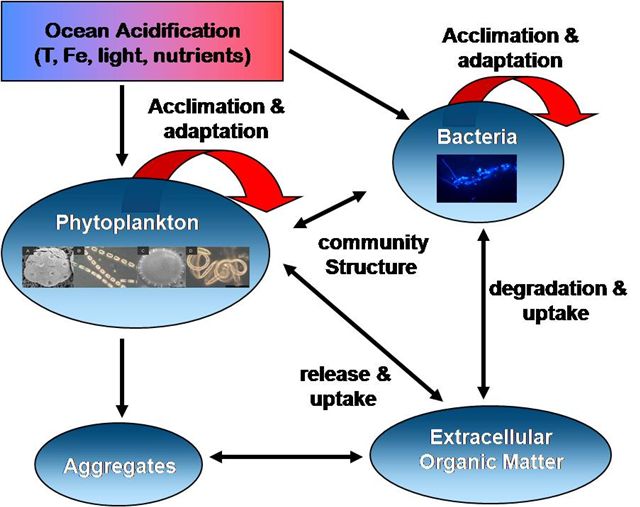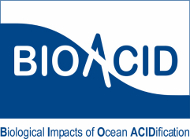BIOACID-II: Biological Impact of Ocean Acidification
BMBF-project „Bioacid II: Biological impacts of ocean acidification (phase II)”
Work Package 1.12: Responses and adaptations of heterotrophic and chemoautotrophic prokaryotic key players to a high CO2 world
The increasing acidification of the oceans due to man-made carbon dioxide is already compelling new evidence. The speed at which the acidity of sea water rises up to date is unprecedented in the past 20 million years. However, the consequences of this process for the marine ecosystems and thus to humans is still unclear.
Heterotrophic and chemoautotrophic prokaryotes are probably differently affected by increasing carbon dioxide concentrations. Whereas the former are mainly indirectly impacted via phytoplankton and dissolved organic matter production (DOC, supply and composition), the activity of the latter group could be directly influenced by changing pH and DIC. During BIOACID phase 2 our goal will be to examine the response and adaptation of selected prokaryotic key players, which are known to be relevant in the Baltic Sea pelagial, by a combination of laboratory and mesocosm experiments.
By participating in in-door Baltic Sea mesocosm experiments (combination of ocean acidification and warming) we will be able to study the response and activity of prokaryotic key species in a complex environmental setting where different factors interact. We will collect samples for following the abundance and activity of the presumed key taxa by 16S RNA/DNA techniques (fingerprinting, 454 sequencing), CARD-FISH (abundance) and CARD-FISH in combination with microautoradiography after incubation with radiolabelled substrates to assess specific activities. Further, species-specific uptake of labelled substrates can be assessed with high sensitivity by NanoSims. Additionally, isolation and cultivation efforts will be applied to obtain other potentially important prokaryotic isolates.
In long-term experiments we intend to culture heterotrophic and chemoautotrophic prokaryotic isolates under defined limitation, and examine the response and acclimation towards changes in concentrations of DIC (chemoautotrophs) and DOC (heterotrophs). Our hypothesis is that due to acclimation (reversible, nongenetic phenotype changes) and adaptive evolution (involving genetic changes, e.g., by mutations) these microorganisms will develop a better performance (higher fitness) than at the start of the experiments and, most important, as observed in the short-term mesocosm experiments.


